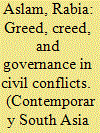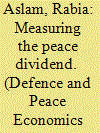| Srl | Item |
| 1 |
ID:
106720


|
|
|
|
|
| Publication |
2011.
|
| Summary/Abstract |
The Baloch nationalists have been actively involved in an armed struggle against the government of Pakistan during the last decade. Indeed, the recent risk assessment report produced by the Minorities at Risk Project places the Baloch population at a high risk for future rebellion. A detailed analysis of the ongoing conflict reveals that in addition to the classic greed- and grievance-based explanations, poor governance resulting from the ongoing plunder of Balochistan's natural resources and its economic and political marginalization has been a major cause of mounting tension between the Baloch people and the government of Pakistan. The presence of insurgent groups and the continuation of violent conflict in neighboring Afghanistan might lead to further instability in Balochistan. The government of Pakistan therefore seriously needs to reform its strategy and address the issues that have lead to the escalation of the conflict under discussion during the last decade.
|
|
|
|
|
|
|
|
|
|
|
|
|
|
|
|
| 2 |
ID:
076428


|
|
|
|
|
| Publication |
2007.
|
| Summary/Abstract |
The paper attempts to trace the nexus between defense spending and economic growth in developing countries, using data for 59 developing countries from 1972-2000. The purpose is to measure the opportunity costs of defense spending mainly in terms of alternative public programs. The correlation of social sector expenditures with growth rate as well as the extent of correlation between social and defense sector spending is not clear in the majority of developing countries. It follows that even if defense spending is reduced, the prospects for a peace dividend in the aftermath of the Cold War might be inhibited by political interests that oppose increases in social sector expenditures. If so, defense cutbacks might not lead to a welfare windfall as is generally presumed. Accordingly, this paper tests whether a defense spending cutback will enhance funding for other public programs and whether such a reallocation of resources will prove to be beneficial for the long-term growth rate of the economy
|
|
|
|
|
|
|
|
|
|
|
|
|
|
|
|
| 3 |
ID:
083663


|
|
|
|
|
| Publication |
2008.
|
| Summary/Abstract |
The purpose of this study is to analyze the ongoing conflict situation between the government of Pakistan and the tribal population groups residing in the tribal belt along the Pakistan-Afghanistan border, while Pakistan aids the United States in its "War on Terror." The article brings into limelight the political problems being faced by the government of Pakistan while it supports the United States and its allies in their mission to combat and weaken the Al Qaeda and Taliban forces. It further attempts to apply some simple game theoretic models to the situation in Waziristan and tries to accommodate the influence of the third party (the United States in this case) on the strategies as well as on the Nash equilibrium of the players in this situation of conflict. The aim of this exercise is to capture and highlight policy insights that might emerge from this strategic analysis. The possible Nash equilibrium depicts that the presence of the third party in the said conflict complicates the situation in an adverse manner. Moreover, the rebels might find it profitable to rebel and retaliate against the government in the subsequent periods due to the grievances caused by the actions of government in the first period. The government of Pakistan therefore seriously needs to rethink and reform its strategy for dealing with the extremists in the case discussed
|
|
|
|
|
|
|
|
|
|
|
|
|
|
|
|
| 4 |
ID:
094847


|
|
|
|
|
| Publication |
2010.
|
| Summary/Abstract |
The historical record of the majority of inter- and intra-state conflicts indicates frequent third-party interventions in these conflicts. In the decades following World War II, the United States has been one of the most frequent interveners in third world internal wars. This study focuses on the repercussions of U.S. military interventions on the intensity of civil conflict and political violence in the targeted nations. A comprehensive empirical analysis suggests that in addition to low per capita income, large populations, high religious fractionalization, and weak governance, the direct and indirect involvement of the U.S. military may also lead to increased civil strife and political violence in the targeted nations. U.S. military involvement increases the probability of political instability and unrest and hence could be one of the many conditions that favor insurgency.
|
|
|
|
|
|
|
|
|
|
|
|
|
|
|
|